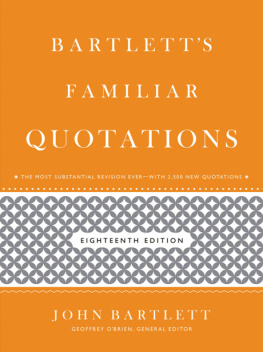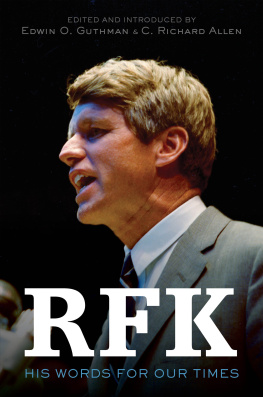In accordance with the U.S. Copyright Act of 1976, the scanning, uploading, and electronic sharing of any part of this book without the permission of the publisher constitute unlawful piracy and theft of the authors intellectual property. If you would like to use material from the book (other than for review purposes), prior written permission must be obtained by contacting the publisher at permissions@hbgusa.com. Thank you for your support of the authors rights.

W HEN THE BOOKSELLER J OHN B ARTLETT PUBLISHED HIS C OLLECTION OF F AMILIAR Q UOTATIONS IN 1855, IT WAS ALREADY THE CULMINATION OF A LONG PROCESS OF COMPILING AND SIFTING . An early reader with an extraordinarily retentive memory, Bartlett, born in Plymouth, Massachusetts, in 1820, had for years kept a commonplace book in which he noted those passages, phrases, and proverbs that he had a penchant for collecting.
The privately printed 1855 edition was only 258 pages long; by the time of his death in 1905, he had overseen nine editions, and his commonplace book had taken its place as an indispensable reference. Bartletts original Familiar Quotations registered the essential influences of his culture: the Bible and Shakespeare above all, flanked by an array of chiefly British writers. Bartletts range may have been narrow, but within it his tastes were solid, and his work has provided an unshakeable foundation for the extensive revisions and additions of the editors who have followed him. The apparent modesty of the sentence by Montaigne that Bartlett affixed to the title page of the seventh edition (1876)I have gathered a posie of other mens flowers, and nothing but the thread that binds them is mine owndoubtless conceals pride in the characteristic aptness of the choice. The book as it evolved under his care became a sort of history of thought and expression, a way for a reader to sail rapidly over centuries and pass them in review. Bartlett knew that familiar is not a word that can be easily definedwhat is familiar to one class of readers may be quite new to anotherand acknowledged that it has been thought better to incur the risk of erring on the side of fullness.
In taking that risk he created not merely a reference work but a unique anthology, a book that can be read straight through, a graph of the thought of centuries spread out like an entrancing scroll. John Bartletts achievement was singular, and it has continued to inspire the editors who have followed him. Bartletts Familiar Quotations has always been, and will remain, a work in progress. Such a book must change over time to reflect not only what has been newly written or said but to take note of how the past changes as well, always renewing itself as new readers and observers uncover fresh perspectives and areas of interest. It is not so much like walking through a museum of fixed exhibits as of tuning in to a millennia-old conversation and picking up, each time, slightly different clusters of fragments and piecing together a slightly different story. The voices resonating in that echo chamber are also talking to one another, and so Bartletts is also a map of interconnections and variants.
Quotations respond to quotations, to affirm them or turn them inside out or perhaps to drown them. One way or another, the conversation sustains itself over vast stretches of timefrom the Sumerian Gilgamesh epic to the newly minted sound bites of the Internet eraeven as it suffers interruption from the intrusions and catastrophes of history. One thing that has changed significantly is the range of source materials on which Bartletts draws. A work that was once dominated by scripture, classical literature, and poetry has opened itself to the multiple voices of mass journalism, recording, movies, radio and television broadcasting, and now the Internet. The digital era offers opportunities that are both exhilarating and overwhelming; we can see a phrase traveling from place to place virtually before our eyes, and we can get a quantitative sense of how widely and quickly it has traveled. Millions of words are captured that would once have disappeared into the wind.
But the age of recording is also the age of ephemerality. The familiar quotations of last year are for the most part well on their way to oblivion. A new edition of Bartletts must gamble on the newest utterances, but only a future editor will be in a position to measure how long-lasting any of them proves. Many voices appear in Bartletts for the first time in this eighteenth edition, some the expected brand-new onesBarack Obama, Anne Carson, David Foster Wallace, Sonia Sotomayor, Steve Jobs, Sarah Palin, Warren Buffett, The Sopranos, South Parkand others from the recent and not-so-recent past whose phrases continue to pervade and sometimes transform the culture. As in any era, but now at a faster rate than ever, catchphrases from many different cornerswhether the anxiety of influence or wardrobe malfunction or the male gaze or the age of mechanical reproduction or gonzo journalismfind their way into the main corridors of speech. This edition expands its international coverage, incorporating important writers from Europe, Asia, Africa, and Latin America, and elsewhere, from Wang Wei and Ibn Khaldun to Wislawa Szymborska and Orhan Pamuk.
It adds the words of over a hundred women. It offers a richer gathering of memorable verbal expression by artists of many kinds (painters, musicians, photographers, architects, filmmakers) and draws more heavily on novelists as varied as Dostoevsky and Elmore Leonard. It acknowledges that the words of songwritersfrom Johnny Mercer, Willie Dixon, and Leonard Cohen to Madonna, Grandmaster Flash, and Kurt Cobainhave an unequaled reach and influence. But here will be found as well astronauts and entrepreneurs, athletes and physicists, rappers, federal judges, deconstructionists, and otherwise almost unknown figures who have given utterance to phrases that continue to make inroads as only the most eloquent or startling or suggestive or even unsettling quotations can. I must gratefully acknowledge the suggestions of many consultants, friends, and colleagues whose guidance has been invaluable in the preparation of this edition. They include Tracy Behar, Susanna Brougham, Devin Dougherty, Evan Eisenberg, Peggy Freudenthal, Katherine Isaacs, Kent Jones, Cynthia Lindlof, Barbara Necol, Michael Neibergall, Heather OBrien, Flaminia Ocampo, Janet Malcolm, Pamela Marshall, Jonathan Miller, Laura Miller, Albert Mobilio, Jed Perl, Robert Polito, Kathryn Rogers, Luc Sante, Harold Schechter, Jill Schoolman, and Drake Stutesman.
I owe a special debt to James Gibbons, who participated extensively in every phase of this project, helping to enlarge its scope in many free-ranging discussions and enriching its contents by uncovering a wide array of memorable contributions. GEOFFREY OBRIEN New York, New York

BASIC INFORMATION
A UTHORS APPEAR CHRONOLOGICALLY IN THE ORDER OF THEIR BIRTH DATES; AUTHORS BORN IN THE SAME YEAR ARE ARRANGED ALPHABETICALLY. The quotations for each author are generally in chronological order according to the date of publication (in some instances according to the date of composition). Poetry generally precedes prose for authors who wrote both. Anonymous quotations are located as follows: early miscellaneous and Latin quotations are placed at about 670 C.E. General anonymous quotations begin immediately after the last dated author and are arranged in roughly chronological order (the precise dates of origin often being unknown).






 W HEN THE BOOKSELLER J OHN B ARTLETT PUBLISHED HIS C OLLECTION OF F AMILIAR Q UOTATIONS IN 1855, IT WAS ALREADY THE CULMINATION OF A LONG PROCESS OF COMPILING AND SIFTING . An early reader with an extraordinarily retentive memory, Bartlett, born in Plymouth, Massachusetts, in 1820, had for years kept a commonplace book in which he noted those passages, phrases, and proverbs that he had a penchant for collecting.
W HEN THE BOOKSELLER J OHN B ARTLETT PUBLISHED HIS C OLLECTION OF F AMILIAR Q UOTATIONS IN 1855, IT WAS ALREADY THE CULMINATION OF A LONG PROCESS OF COMPILING AND SIFTING . An early reader with an extraordinarily retentive memory, Bartlett, born in Plymouth, Massachusetts, in 1820, had for years kept a commonplace book in which he noted those passages, phrases, and proverbs that he had a penchant for collecting.